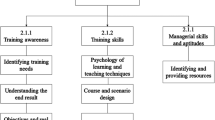Abstract
In accordance with Part A, Chapter I, Section I/11 Revalidation of Certificates of the Standards of Training, Certification and Watchkeeping for Seafarers (STCW) 2010 Convention, continued evaluation of professional competence shall be established, among others, by successfully completing an approved training course or courses. Every master, officer and radio operator holding a certificate issued or recognised under any chapter of the convention other than chapter VI, who is serving at sea or intends to return to sea after a period ashore, shall be required, at intervals not exceeding 5 years, to demonstrate continued professional competence, in order to continue to qualify for seagoing service. The main objective of this research is to design a model course using simulation technology to train and demonstrate seafarers’ competence in accordance with the provisions of STCW Code for existing seafarers who need to revalidate their professional maritime certificates also in accordance with the standards governing the use of simulators, Reg I/12 of 2010 STCW Code. The purpose of this revalidation simulation-based model course is to assist maritime training institutes and their teaching staff in organising and introducing specific training courses for revalidation of certificates of competence (CoCs) as well as enhancing, updating or supplementing existing training material where the quality and effectiveness of the training courses may thereby be improved. Only those STCW competences relating to ship bridge simulators will be considered for the model course scenario development and testing.






Similar content being viewed by others
References
Barahona C, Hernández JL (1999) How the revised STCW 95 affects English language training. D. L. Newman & M. Van Campenhoudt (Eds.) Maritime terminology: issues in communication and translation. Proceedings of the First International Conference on Maritime Terminology. Brussels: Éditions du Hazard, 214-227
Bjorklund R, Rodahl K, Robertson BJ, Wohni B, Otherhals O, Overas P, Vespestad J, Midtgard A, (1987) Effects of maritime simulator training on performance. MARSIM 1987, Trondheim, Norway
Boer JPA (1991) Het gebruik van simulatoren voor opleiding en training: bepalende factoren voor de waarde van een simulator als leermiddel. (in Dutch), TNO-IZF, Soesterberg, Netherlands
Cross SJ (1993) An evaluation tool for simulator training. MARSIM 1993, St. John’s, Canada
Cross SJ (1996) Methodology for bridge simulators skills assessment. MARSIM 1996, Copenhagen, Denmark
Daggett L (1994) Validation: the Ideal and the real; recent experiences, validation workshop. 21st Annual IMSF Meeting, Horten, Norway
Universitat Politècnica de Catalunya UPC (2014) Model course to demonstrate and revalidate decks officers’ competences by using simulators. IAMU 2103 Research Project, International Association of Maritime Universities. ISBN 978-4-907408-05-3
DGSM, TNO/MSR et al. (1994) Simulator time and its seatime equivalence. Rijswijk, The Netherlands
DNV, Det Norske Veritas (1996). Rules for classification of maritime simulator centres. DNV, Høvik, Norway
Dubin F, Olshtain E (1986) Course design. Developing programs and materials for language learning. Cambridge: Cambridge University Press. http://iamu-edu.org/moodle/. Accessed November 2014
IMO ISWG (1994). STCW 26/Inf. 7. Sub-Committee STCW, submitted by Consultants/ISWG, IMO
IMO (1996) Assessment testing in a full mission bridge simulator. STW28/INF14, IMO, London, UK
IMO (2005) IMO model courses. IMO, London, UK
IMO STCW (2011) International Convention on Standards of Training, Certification and Watchkeeping for Seafarers, (STCW) 1978, as amended in 1995/2010, International Maritime Organisation, London, UK
IMSF CWG (1994) Draft classification system. Classification Working Group. St. John’s, Canada
INSLC (1990) Recommended specifications for radar and navigation simulators. International Navigation Simulator Lecturers Conference, 1990
Kayten PJ, King TA, Korosh WM, Miller WC, Kaufman EJ, Williams KE (1982) Assessment of simulator based training for the enhancement of cadet watch officer performance. Caorf research study, 15-8110-02. National Maritime Research Center, Kings Point, New York, USA
McCallum MC (1996) Criterion based assessment of marine simulator operator performance. Conference on Marine Simulation, Alexandria, Egypt
MSA (1995) The effectiveness and practical application of simulators as tools for training and examining seafarers. MSA, Southampton, UK
Muirhead PMP (1988) The validation or marine simulator training. 5th INSLC, Launceston, Australia
Rowntree D (1987) Assessing students: how shall we know them. Kogan Page, London, pp 81–167
Tonsberg Maritime College et al. (1987) Report on development project sea duty on simulator. Tonsberg, Norway
Acknowledgements
This paper presents the main results of the IAMU Research Project entitled “Simulation-based model course to demonstrate seafarers’ competence for deck officers discipline”, relevant for maritime and education training and simulation. The material and data in this publication have been obtained through the support of the International Association of Maritime Universities (IAMU) and the Nippon Foundation in Japan.
Author information
Authors and Affiliations
Corresponding author
Appendices
Appendix 1
Appendix 2
Appendix 3
Rights and permissions
About this article
Cite this article
Castells, M., Ordás, S., Barahona, C. et al. Model course to revalidate deck officers’ competences using simulators. WMU J Marit Affairs 15, 163–185 (2016). https://doi.org/10.1007/s13437-015-0092-2
Received:
Accepted:
Published:
Issue Date:
DOI: https://doi.org/10.1007/s13437-015-0092-2




